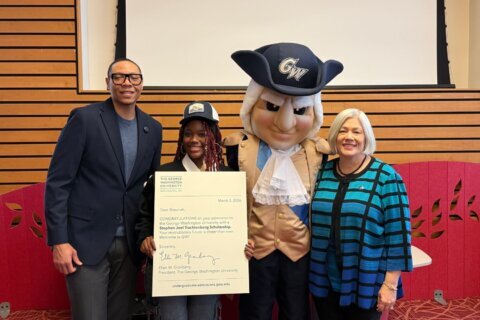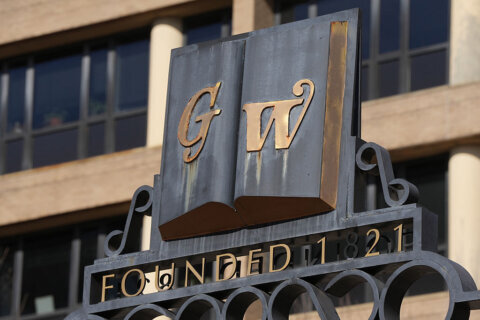The District’s revised criminal code faces its final hurdle before becoming law in the U.S. Congress, where even D.C. Council Chairman Phil Mendelson — who has long championed the revision — has admitted it’s an uphill battle.
After the House voted to block the revised criminal code in a resolution earlier this month, the decision now heads to the Senate, where Republicans are calling the new code dangerous and soft on crime.
“They are making the Democrats uncomfortable,” Mendelson said. “A significant number of Democrats in the Senate are up for election next year. And they do not want to see campaign messages about how they’re soft on crime.”
The revised criminal code is a major overhaul of the District’s criminal laws. Among other things, it would reduce maximum penalties for burglary, carjacking and robbery.
But Mendelson argued that Republican Congress members — who point to the lower maximum sentencing guidelines for a few violent criminals — are wrong in saying the revised code will make the nation’s capital more dangerous.
“The (revised) criminal code will not make the city less safe,” Mendelson said. “And that’s because sentencing in itself does not have a deterrent effect on crime. What does? It’s swift and certain justice. When somebody commits a crime that they’re caught — they’re caught quickly; they are prosecuted quickly and aggressively. That has a deterrent effect on crime.”
During an exclusive interview on the WTOP’s DMV Download podcast, Council Chair Mendelson defended the revised criminal code against opposition from all directions: congressional Republicans as well as D.C.’s mayor and the city’s chief of police.
‘This is a complicated document’
The revision to the District’s century-old criminal code has had a long and winding road before getting to Congress.
The D.C. Council started the revision process in earnest back in 2016. They tasked the independent Criminal Code Reform Commission with updating the old code that references steamboats and horse stables. Six years later, the committee created an updated code, and the Council passed it — twice. D.C. Mayor Bowser vetoed the revisions the first go-round.
“Anytime there is a policy that reduces penalties, I think it sends the wrong message,” Bowser said when vetoing the bill.
Mendelson said the mayor’s criticism is empty.
“I don’t think the mayor fully understands the bill because many of her criticisms that she’s leveling now, she didn’t level in December when we were voting or in November when it came out of committee,” Mendelson said. “And so it’s easy to say ‘it makes the city less safe,’ but prove it to me.”
But Bowser is not the only local official that takes issue with the revised code.
D.C. Chief of Police Robert Contee has also said the code will make the city less safe and argued the lower sentencing guidelines will rob the victims of their due justice.
“I don’t think victims win in that space,” Contee said on the DMV Download podcast earlier this month, referring to the reduced penalties for some crimes. “I mean, there are few people who are making these decisions when I am out there standing over someone’s child.”
While Mendelson agreed that victims deserve swift and definitive justice, he said sentencing is not up to them.
“What exactly is justice?” Mendelson asked. “Is it 10 years, 20 years, 40 years? I think that depends upon the circumstances of the case and not necessarily what the victim wants.”
Mendelson then offered a hypothetical.
“It could be that for a 16-year-old, as horrible as it is, that a 16-year-old might murder somebody,” he said. “Then when they’re 45, we maybe don’t want to keep them in prison. We recognize that he or she is a very different person.”
Mendelson chalked up much of the criticism of the legislation to what he called “fearmongering.”
He added, “I think that the chief of police … doesn’t fully understand what some of the changes are in the criminal code. And that may not make sense, but this is a complicated document.”
He said, for example, that under the current criminal code, robbery is a single offense. The revised version creates first-degree, second-degree and third-degree robbery offenses to denote increasingly serious offenses with differing penalties for each.
“The point being that this is complex, and the room for a lot of misunderstanding,” Mendelson said.
WTOP has reached out to the mayor’s office for comment on the council chairman’s comments.
‘It does not make the District less safe’
Mendelson said the complicated nature of the criminal code makes it easy for local politicians to call it dangerous.
“It’s really easy to demagogue crime and just to say, ‘We’re coddling criminals,'” Mendelson said. “We’re increasingly a headline society. So the headline, kind of like, nails it.”
Regardless of the local debates over D.C.’s criminal code, its fate is now up to politicians outside the District — members of Congress.
When asked what he’d say to senators weighing their vote, he said, “my first message is, it does not make the District less safe.”
Mendelson added that D.C. deserves to govern itself and warned that if Congress blocks the revised criminal code, it will “embolden Republicans to go after us on other issues.”
The revised criminal code will only be blocked if the Senate also passes a resolution against it and President Joe Biden signs off on the resolution. So far, Biden has opposed the resolution but has not said whether he’d veto it.
D.C. statehood would solve this issue of congressional review, of course, but Mendelson acknowledged the fight for representation will have to wait until 2024.
“This summer I visited the cemetery at Omaha Beach and placed a flag at a tombstone for a District of Columbia resident who died on D-Day,” Mendelson said. “Our sons and daughters go to war, and just like in Nebraska, or Kansas or any other state, but we do not have any representation — to vote, to go to war or to not go to war.”








